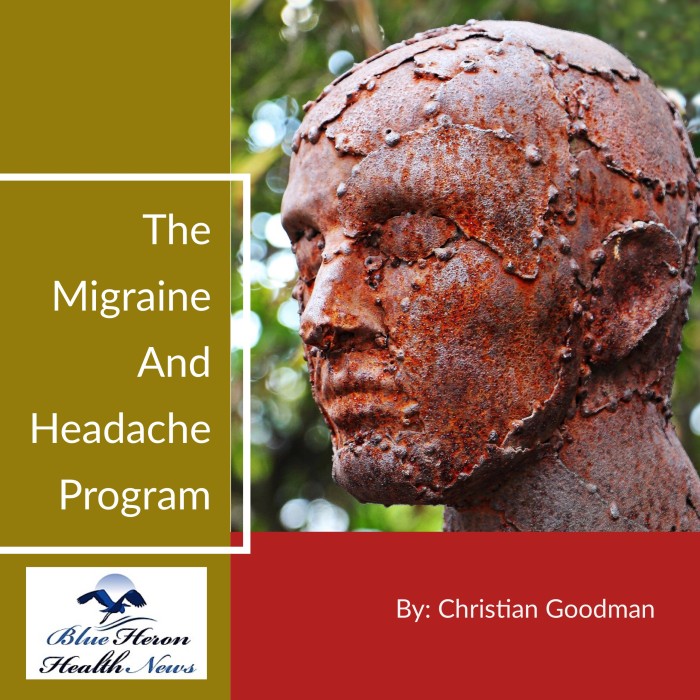
The Migraine And Headache Program By Christian Goodman This program has been designed to relieve the pain in your head due to any reason including migraines efficiently and effectively. The problem of migraine and headaches is really horrible as it compels you to sit in a quiet and dark room to get quick relief. In this program more options to relieve this pain have been discussed to help people like you.
How can one cope with the emotional impact of chronic migraines?
Coping with the emotional impact of chronic migraines can be challenging, but there are several strategies that can help manage both the physical pain and the associated emotional and psychological effects. Here are some approaches to consider:
1. Educate Yourself About Migraines
- Understand the Condition: Learning about migraines, their triggers, and treatment options can empower you to manage the condition more effectively. Understanding that migraines are a neurological disorder, not just “bad headaches,” can also help in coping with the emotional burden.
- Keep a Migraine Diary: Tracking your migraines, including triggers, duration, and intensity, can help you and your healthcare provider identify patterns and develop a more tailored treatment plan.
2. Seek Professional Support
- Consult a Specialist: Working with a neurologist or headache specialist can help you find the most effective treatment options. Proper management of migraines can reduce their frequency and severity, alleviating some of the emotional stress.
- Mental Health Counseling: Therapy, particularly cognitive-behavioral therapy (CBT), can help you develop coping strategies for the emotional impact of chronic migraines. Therapy can also help address any associated anxiety, depression, or stress.
3. Develop Stress Management Techniques
- Mindfulness and Meditation: Mindfulness practices can help you manage stress and reduce the emotional toll of chronic pain. Meditation, deep breathing exercises, and progressive muscle relaxation can all be effective in reducing migraine frequency and severity.
- Yoga and Gentle Exercise: Regular physical activity, such as yoga or walking, can help reduce stress and improve your overall mood. Exercise also promotes the release of endorphins, which are natural painkillers.
4. Build a Support Network
- Connect with Others: Joining a support group for people with migraines can provide emotional support and reduce feelings of isolation. Sharing experiences with others who understand what you’re going through can be incredibly validating and comforting.
- Communicate with Loved Ones: Be open with family and friends about your condition. Let them know how they can support you, whether it’s helping out during a migraine attack or simply listening when you need to talk.
5. Practice Self-Compassion
- Acknowledge Your Emotions: It’s normal to feel frustrated, sad, or angry about having chronic migraines. Allow yourself to feel these emotions without judgment. Recognize that it’s okay to have bad days and that you’re doing your best to manage a challenging condition.
- Focus on What You Can Control: Instead of dwelling on what you can’t do because of migraines, try to focus on the things you can control, like your treatment plan, lifestyle choices, and self-care routines.
6. Create a Migraine-Friendly Environment
- Reduce Triggers: Identify and minimize exposure to common migraine triggers, such as bright lights, loud noises, certain foods, or stressors. Creating a comfortable, quiet, and dark space where you can retreat during an attack can also help.
- Establish Routines: Consistency in your daily routines, including sleep, meals, and exercise, can help manage migraines and reduce their impact on your emotional well-being.
7. Address Anxiety and Depression
- Medication: If you’re struggling with anxiety or depression due to chronic migraines, talk to your healthcare provider about whether medication might be appropriate. Some medications can address both migraine prevention and mood stabilization.
- Mind-Body Techniques: Techniques such as biofeedback, guided imagery, and relaxation exercises can help manage anxiety and depression related to chronic pain.
8. Set Realistic Goals
- Pace Yourself: Chronic migraines can limit your ability to do certain activities. Setting realistic, achievable goals can help you maintain a sense of accomplishment and avoid the frustration of setting expectations that are too high.
- Celebrate Small Wins: Acknowledge and celebrate small victories, whether it’s a day without a migraine, managing stress effectively, or finding a new coping strategy that works for you.
9. Maintain a Positive Outlook
- Focus on Positivity: While it can be challenging, try to focus on the positive aspects of your life. Engage in activities that bring you joy and satisfaction, even if they need to be adjusted due to your condition.
- Seek Joyful Distractions: Engage in hobbies, reading, art, music, or other activities that can provide a positive distraction from the pain and help lift your mood.
10. Stay Informed About New Treatments
- Explore Treatment Options: Stay informed about new migraine treatments and therapies. Advances in medication, devices, and alternative therapies are continually being made, and something new might work for you.
- Be Your Advocate: Advocate for your own health by staying proactive in your treatment plan, asking questions, and seeking second opinions if necessary.
By combining these strategies, you can better manage the emotional impact of chronic migraines, improve your quality of life, and regain a sense of control over your condition.

The Migraine And Headache Program By Christian Goodman This program has been designed to relieve the pain in your head due to any reason including migraines efficiently and effectively. The problem of migraine and headaches is really horrible as it compels you to sit in a quiet and dark room to get quick relief. In this program more options to relieve this pain have been discussed to help people like you.